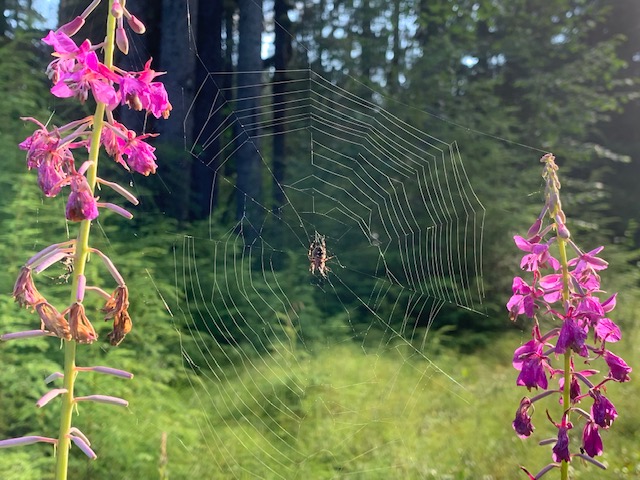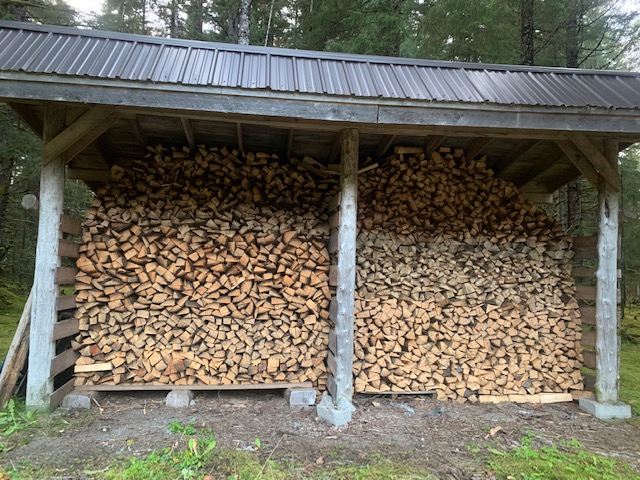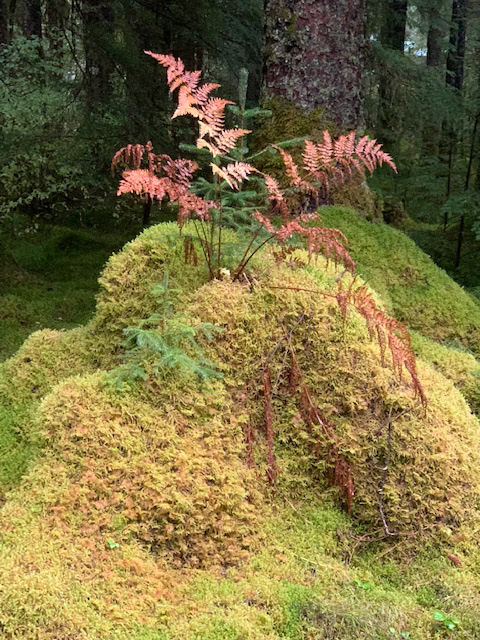A Blog of Personal Thoughts
Living off the Grid in a Small House
October 2022
Twenty-five years ago we moved to a small off-the-road-system town in Alaska. We moved to an Alaskan style of life, one quite different from New England, New York, Oregon, or Kansas. We knew what we were getting into and chose it intentionally. We were tired of overworking, I about 70 hours a week and Robert closer to 100. We were also tired of the noise and crush of people and crime. How do we live now? Much simpler. When our son finished building the house, we were living off the grid in a small house.
 |
Spider and web with fireweed anchors. |
In 1997, under the kitchen sink we had seven buckets: aluminum, #1 and #2 plastics, glass, burnables, compost, tin cans, compactables. Everything fits into a category of re-use, recycle, or dispose; after re-use and recycle, there's not much left to dispose. Aluminum, crushed at home, #1 and #2 plastics, flattened tin cans and metal lids go to Seattle for recycling; the town gets money for the aluminum. Aluminum and plastics are recycled into other things. I don't know what aluminum becomes but plastic turns into tables and benches, sweatshirts, balls and other playground equipment. Corrugated cardboard, compressed and banded, is also shipped to Seattle for recycling. The town crushes the glass here either for re-use by individuals for their leach field or disposal at the dump. (I like the word dump for we call our person-in-charge Dumpmaster, like the names Harbormaster, Postmaster.) The burnables we use to start our wood fire in the mornings. On warm days, when we don't have a fire, we save them until we are going to burn outdoors. The compost is the food waste, for us just vegetable matter and maybe a few fish bones; the dog gets our seldom meat scraps. Our compost goes to the dump, composted, and in spring sold for a nominal fee for gardens. We pay an annual $30 fee to participate in the dump's re-use, recycle, and dispose efforts. Compactables used to include #3 though #7 plastics, a used Pilot pen, dirty cardboard boxes, paint cans—items that go nowhere else. These disposable items, first crushed in the Dumpmaster's compactor, go in the landfill. Each layer he then covers with magazines, a layer of plastic, then dirt. Other items like metal binding bands, bits of drywall, heavy or large metals go in another pit because they're too big to go in the compactor. As I write this morning, Robert, Seth, and friend Eric are at the dump compacting and banding recyclables.
Outside, I never thought about all this. I saved the aluminum cans and took them to school. When we recycled there, we received money for them that went to the PTO. We also recycled newspaper, glass, and plastic as a service to our families and as a lesson to the children. The rest of my home trash went in the cans out back at the alley and on Wednesdays at about 10:00, the dump truck came and collected it and took it to never-never land. Now I think: What do I use? How does this impact the environment? What will it do to our town? I'll cover a dish with a lid or a plate, or if I'm going to eat it the next day, I put it in the fridge with no lid—and nothing terrible happens to it. It's a bit like life during World War II. When I was three, I had my first three jobs—step on the tin cans, pick up all the twigs before Jerry or Jelly Bean came to mow the lawn, and empty the fourteen wastebaskets. I made sure I was in the kitchen when my mother prepared supper just in case she needed any cans crushed. I found stepping on tin cans far preferable to helping the war effort than eating my spinach, asparagus, dandelion greens, or liver while thinking of the starving children in China. One aunt lived in China then and sent a picture of a crying, starving child sitting, mostly naked, on a street surrounded by bomb rubble. I desperately wanted to send him not only my spinach and asparagus but entire meals, but I couldn't figure out how the food could last that long boat trip. I dutifully thought about the starving children in China…and still have the postcard of that crying child sitting in the rubble.
I learned new habits here. Take off your shoes when you enter anyone's home, the library, or the primary wing of the school. Use a water filter for drinking water. The water is fine to drink but it has a lot of iron in it from the grinding of the glacial rocks. Do not own white clothes for the iron from these ground glacial rocks will turn them a most unattractive beige.
We have no curtains. Who will look in the windows—a moose, a raven, Baba Yaga? I think not and we want all possible light in winter. We learn to sleep in the light of summer for the thought of losing any daylight is abhorrent.
Gasoline. We use a tank about every three to four weeks. An old pickup which gets about 12 miles to the gallon. Someone in town has an electric car--paid a few thousand for it, 20,000 miles on it. With no hills here and so little roadway, we could easily be an electric car town! Robert and I have one vehicle and two bicycles. Go to the post office every day? Why? Am I about to receive some time-sensitive item? In autumn and winter, you can tell if the planes don't fly, and if they don't fly, we get no mail. It's pleasant not to go every day. Three or four days of mail is bound to have something more that an advertisement or a bill.
When I ride my bicycle, I see the beauty of the woods along the road. Bear and moose tracks. The forest opens up and the "prairie" expands from Chichagof Island to the Bear Track Mountains. The flat roadway rises to meet Excursion Ridge and I feel I ride on air. I circle the white lines in the center or weave in and out between them. Can I get three full swerves between them or only two? The first flowers of spring—dandelions precede lupine, columbine, chocolate lilies, fireweed, and the yellow leaves of autumn's cottonwoods. Summer's a little longer than that sentence…but not much. I almost ran into a bear one day on my bicycle. I'm lollygagging along, avoiding potholes in the dirt road and, whoa, a large black bear runs across the road about forty feet in front of me. I'm glad he was running and I was riding so slowly, but we were close enough I could see the sun glisten his individual hairs. A collision would not have been a pretty sight.
When first living here, I was afraid of bears. I did not want to see one. Now it has become like having cardinals in the garden—only less often—a familiar wild critter to watch. Robert saw a picture in the Southeast weekly paper of two brown bears at the Angoon dump--one sitting in a recliner chair, the other reclining on an old mattress! I'm sending it to my friend Abigail Thomas who won't come see me because of bears. She lives in New York City…and finds that safer than here. Abigail…we share a name, Welsh ancestry, dreams, friendship, all from long ago. We lost contact for 30 years until Glimmer Train, a lit magazine sent me a card to subscribe. Authors listed with a few words and signatures. Abby's familiar signature caught my eye before her name. We met a few years later at the Barnes & Noble on 84th & Broadway. No gap, other than my awareness of how much I had missed her for 37 years. We met again a month ago. I went to New York after 11 September to visit my friends. Abby and I met for lunch in the Village. Service was very slow—so slow I waited about an hour for a refill on tea and we waited over an hour for the bill. It never came and like two teenagers, two sixty-year-old women stiffed the restaurant, laughing for three blocks. I told Abby not to run; it seemed like a bad time to run in New York City.
 |
Winter’s Wood Supply |
Someone Outside said of our wood heat, "Labor intensive." I've thought a lot about that. We paid $100 for our wood stove, and $75 three decades ago for our still functional wood cook stove which I use occasionally for certain items. We pay nothing for the wood. We have at least two to three years supply cut and stacked, and at least 200 standing dead pine trees waiting for us to use. It costs us nothing to heat our cabin. We earn nothing, we pay nothing. To cut the tree, stack the wood, move it to the fire is physical exercise—no need to pay for the car and the gas to drive to the gym, pool, or to go jogging. Our gas heat and electricity in Topeka ran $120 a month. Our electricity here is $30 a month. For us that was about eight hours of work, one day, not including driving time to and from work, upkeep and gas for the car, easily $300, or two and a half work days a month. We never had car payments, being the sole owner of our '69 Camaro and having two other old vehicles. Our wood for two to three winters took maybe 100 hours to cut and stack. No need to jog or swim to stay in shape. I paid $33 a month to use the pool. I worked four days a month, almost a week a month to drive to work and swim to stay in shape and reduce the stress of work! I can swim here in summers. Outdoors, under blue sky. One of the ponds at the gravel pit is 62 degrees the end of May.
How much does it cost people to heat and air condition their home and how many hours do they work for that?
Wood fires are a fun and social event—in the getting and the burning. I bought a stovepipe thermometer and when Robert was Outside last winter, Barbra came for dinner. We started a fire. Put the thermometer on the stovepipe, stovetop, back to the stovepipe and watched it climb from cold to perhaps 300˚ or 400˚. Pleasure on an Alaskan winter evening! We traded fire stories then—how her husband's fire once had the entire stovepipe red; the smell of my sneakers (feet inside them) resting on the stove at a remote Nova Scotia cabin one cool summer evening decades ago with my cousins; cooking with my brother and sister as we knelt on the Sarouk carpet in the den after Hurricane Carol took our electricity. A quiet evening's laughter, conversation and entertainment, which now seems unique only to Alaska and other northern climes.
Robert got some wood from the airport project and split it. The smell of pine and spruce transported me to Maine—reading Paddle-to-the-Sea, going on wood walks with my father who, even in the woods, wore a suit, white shirt and tie. Yesterday we took cabbage soup and French bread to Seth and Kezia's for lunch and Seth offered us some shark, my first delicious taste. At the end of tossing and stacking a cord of spruce and pine, I heard Seth say something about a good family event. Wood provides warmth far beyond its BTUs.
 |
A Fall Fern. |

|
